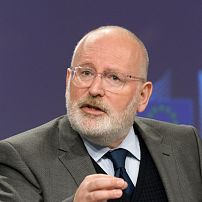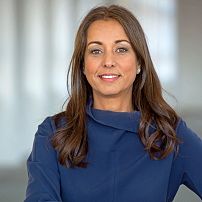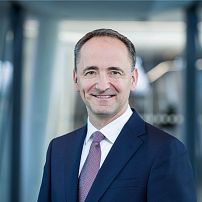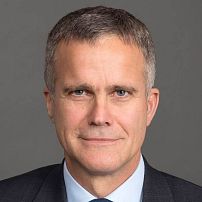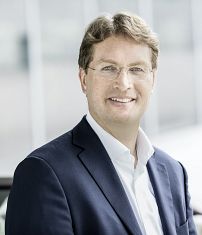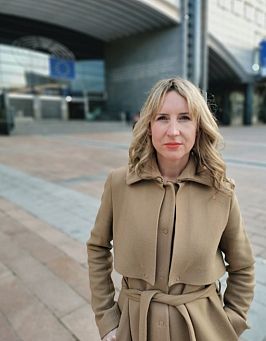We'll be asking some of Europe’s biggest industrial leaders about applying the Green Deal in the real world.
From big pharma to luxury car makers, some of Europe's industry giants have voiced their support for a climate-neutral Europe by 2050.
 ADVERTISEMENT
ADVERTISEMENT
 ADVERTISEMENT
ADVERTISEMENT
The business leaders have committed to Europe’s ambitious carbon goals in the European Round Table for Industry’s paper, making the most of Europe’s climate leadership.
As well as voicing their support, the paper describes the key approaches to adopting the EU Green Deal, and outlines the pressing issues that still need to be addressed.
We heard from some of these industry leaders, as well as European Commission Executive Vice-President for the European Green Deal, Frans Timmermans, during a virtual debate on Monday 15 February (you can watch the full debate in the video player above).
What is the EU Green Deal?
The Green Deal is a set of EU policy initiatives for achieving climate neutrality by 2050, while strengthening Europe’s economic competitiveness and establishing the EU as a global leader in tackling climate change.
Goals include cutting the EU’s greenhouse gas emissions by at least 50 per cent by 2030, scaling up the circular economy, and implementing carbon pricing to influence a shift in consumer and business behaviour.
“The transformative agenda of the European Green Deal is as demanding as it is compelling,” said Dimitri Papalexopoulos, Vice-Chairman of ERT. “The scale of the transition involved requires strong and sizeable collaboration between governments, society, industry and the wider business community.”
“If we get this right, it presents an opportunity to make Europe more sustainable and more prosperous,” said Papalexopoulos. But how can we ensure that nobody is left behind in this major transition to a carbon neutral continent?
‘We need to act now’
“Ten years ago, we believed in wind energy, but we did not have the turbines,” said Ignacio S. Galán, Chairman and CEO of Iberdrola. “So we need to convert traditional industries to make these. If we want all this to be manufactured in Europe and create jobs, we need to act now.”
Keen for the EU Green Deal to be an opportunity for business and economic growth, Timmermans agreed that Europe must act with some urgency if it is to become the showcase for climate neutrality and stop businesses from going abroad. Re-skilling the workforce is crucial to this: “The risk of mass unemployment is not going to be linked to a lack of jobs, the risk of mass unemployment is going to be linked to a lack of skills if we’re not careful,” he said.
“And the non-availability of a skilled workforce will be a driving force for industry to leave Europe. So we have to make sure that in this transformation that all interested parties, in the private sector and public sector, make sure that skilling and re-skilling becomes a natural thing we do,” added Timmermans.
“Europe should be the best place to innovate for industry if we want to create jobs,” said Dr. Ilham Kadri, CEO and President of the Executive Committee of Solvay.
What is carbon pricing and how can we maintain economic competitiveness in Europe?
Around 45 per cent of Europe’s emissions are currently covered by carbon pricing, meaning that companies pay a price for the amount of carbon they emit. While we need to cover 100 per cent of these emissions with carbon pricing, BP Chairman Helge Lund says we need a “carbon border adjustment” to ensure that Europe doesn’t lose out in the process. “It would be a tragedy if Europe's businesses committed to change, only to be undercut by those operating more cheaply in places where there is no carbon pricing,” said Lund.
Lund added, “it means that anyone supplying carbon-intensive supplies to Europe should also pay a carbon price. Designed well, it could create European jobs through creating a green-levelled playing field for business. And best of all, it could help protect our planet too - incentivising countries around the globe to speed up their own journey to net zero.”
Will the Green Deal reach beyond Europe?
“You can’t stop at just the borders of your own company, you have to look upstream and downstream,” said Ola Källenius, Chair of the Board of Management of Daimler AG. “That is why we’re also asking, urging, and eventually, forcing our suppliers to follow our lead. So if you want to do business with Daimler in the future, you have to have a credible path to CO2 neutrality as well.”
There is no ‘silver bullet’ to address climate change
“Beyond the overarching policies that we’ve talked about, we have to get specific, with complex solutions to complex problems,” said Papalexopoulos. “We can’t pretend that we have a silver bullet to address everything.”
Above all, Jim Hagemann Snabe, Chairman at Siemens said, “policymakers can help the framework, but the doing comes from companies and from consumers.”
Meet our panel:
Frans Timmermans
Dutchman Frans Timmermans has served as European Commission Executive Vice-President for the European Green Deal since December 2019. He discussed how industries can successfully transition and what this means for jobs, the cost burden, investment and the possibility of re-skilling the workforce.
Dimitri Papalexopoulos
Dimitri Papalexopoulos is Chairman of the Group Executive Committee, TITAN Cement Group, an international cement and building materials producer active since 1902.
A firm believer in the European project, Dimitri is also Vice-Chair of the European Round Table for Industry (ERT) and Chairman of the ERT Committee on Energy Transition & Climate Change.
He spoke about ERT’s global position on the Green Deal.
Ilham Kadri
Dr. Ilham Kadri is CEO and President of the Executive Committee of Solvay, an advanced materials and specialty chemicals company which addresses key societal challenges in sustainability.
Ilham talked about the role of innovation, development and deployment in achieving climate-neutrality.
Jim Hagemann Snabe
Jim Hagemann Snabe is Chairman at Siemens AG (D), Chairman at A.P. Møller-Mærsk (DK), and Vice Chairman at Allianz SE (D). He serves as a member of the Board of Trustees at the World Economic Forum (WEF) and is Adjunct Professor at Copenhagen Business School (CBS). Snabe shared his insights into how digital solutions can support climate neutrality.
Helge Lund
Helge Lund joined the BP Board as a non-executive director and chairman designate in July 2018. He was appointed chairman in January 2019.
As Chairman of BP, Lund spoke about the challenge of achieving climate-neutrality without losing industry, as well as the role of carbon pricing.
Ola Källenius
Ola Källenius joins us as the Chairman of the Board of Management of Daimler AG to discuss how, as one of the world’s biggest producers of premium cars, the company is making the transition to cleaner technologies.
**
Ignacio S. Galán**
Ignacio S. Galán is Chairman and CEO of Iberdrola, and Chairman of ScottishPower, Avangrid and Neoenergia, the country subholding companies of the Iberdrola Group in the UK, USA and Brazil, respectively. He talked about the vision of a climate-neutral energy system and the changes and implications it will have.
Our moderator
Méabh Mc Mahon is a Brussels-based reporter for Euronews. Originally from Ireland, she has over ten years of experience of live TV and radio broadcasting in a range of European languages, as well as hosting conferences and other live events. @brusselsness












